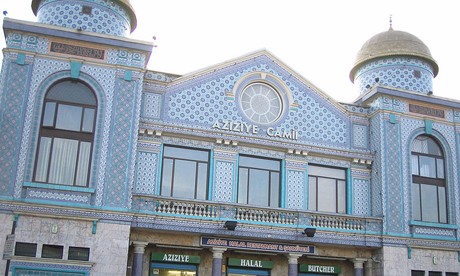University of East London opens Islamic Finance Research Hub

The Aziziye Mosque in Stoke Newington. Photograph: Tom Jones Coaley (from Flickr)
The ancient economic principles of Islam may come to define a new era in banking.
Islamic banking is based on sharia principles of risk-sharing, asset-based investments and zero-interest lending and borrowing.
It is one of the fastest growing financial sectors in the marketplace.
The University of East London has put itself at the forefront of the industry, this month opening the doors to its Islamic Finance Research Hub at its Docklands Campus Library – one of the first of its kind in the country.
The centre will offer masters degrees in Islamic finance and banking, and conduct microfinance and sharia compliance research with an eye to expanding the industry.
The university hopes to recruit the “waiting student base” in Hackney, which is 14 per cent Muslim. But experts stress Islamic banking, also known as ethical banking, is not just for the devout.
Nora Colton is Dean of UEL’s Royal Docks Business School, and a representative of Islamic Developement Bank, is among those working to build education in Islamic banking beyond the Muslim community.
The rules of sharia law, and the way it treats money have meant that, historically, devout Muslims have not kept their money in conventional banks.
Practices that have come to define western conventional banking are deal-breakers in Islamic finance.
Charging or receiving interest (riba) is banned.
So are high-risk investments and speculation. Generally, investments must be asset-backed, and a system of profit and loss sharing (musharaka) means risk is shared between lender and customer.
Islamic banks, or Islamic arms of high street banks (Barclays, Lloyds and HSBC all have them) do not do business with industries deemed illegitimate by Sharia law – tobacco, porn, alcohol, pork, arms and booze are all no-go areas, along with any other transactions deemed harmful to society or the environment.
No great surprise, then, that Islamic banking has not always thrived among its risk-loving western counterparts.
But the global market demands, increasingly, that the two coexist.
Muhammad Shikder of the sharia-compliant Gatehouse Bank said: “Islamic banking, by its very definition, means ethical banking.
“If a company has more than 30 per cent debt we wouldn’t invest in that company. We look at how companies generate income. If they generate income through interest, we wouldn’t allow that either.
“In conventional banking they can take any risks they want and make up for it by setting interest rates accordingly.”
The industry has seen tremendous growth. The Financial Times has reported that assets in Islamic banking will top $1.8trillion globally by next year. Huge sums have been invested in the UK via sharia-compliant investments, lots of them in London’s property market.
London has become the largest international centre for Islamic finance outside the Muslim world.
In October, the city will host the World Islamic Economic Forum (WIEF), marking the first time the event has been held in a non-Islamic or Asian city.
All the signs are there that Islamic banking will grow in east London. Europe’s largest Islamic bank has recently invested £20million in a property development on the Silicon Roundabout.
This massive growth is certainly big business — but that’s one of its greatest limitatons.
Industry leaders have identified a gap in services that may alienate less wealthy sectors who want opportunities within sharia compliant products, or just an alternative form of banking. A lack of awareness of all kinds of alternative banking, Islamic or otherwise, has compounded the problem of relatively slow growth in the retail sectors.
Through its research, UEL hopes to close this gap, and some providers are wise to the growing demand for Islamic products.
However, the Islamic Bank of Britain remains the UK’s only wholly sharia-compliant retail bank.
Of its six branches nationwide, two of them are in London (one is on Whitechapel Road). Some mainstream banks, Lloyds TSB and Barclays among them, offer Islamic current accounts, as do credit unions like the Hackney-based London Community Credit Union (LCCU).
LCCU offers retail Islamic bank accounts but not loans. But it’s not all down to the banks themselves.
The deregulation of conventional banks, and the cavalier approach that the industry has become known for, has been met with complacency among ordinary consumers.
Muslim or not, the average customer knows relatively little about where they put their money.
As Nora Colton says: “Government backing of the banking industry has created complacency. When you went to get your bank account did you ask to see their annual report so you could see how that bank was investing the money?
“People generally pick their banks on convenience. If people had been literate in investigating banking practices, we would have seen that our banks were making risky investments with our money.”
“The attraction to Islamic banking” says Colton, “is not the word ‘Islam’ but because it’s perceived as a more prudent, conservative approach to banking. The fact that we have one dominant banking system is not always in the best interest of the consumer.”
